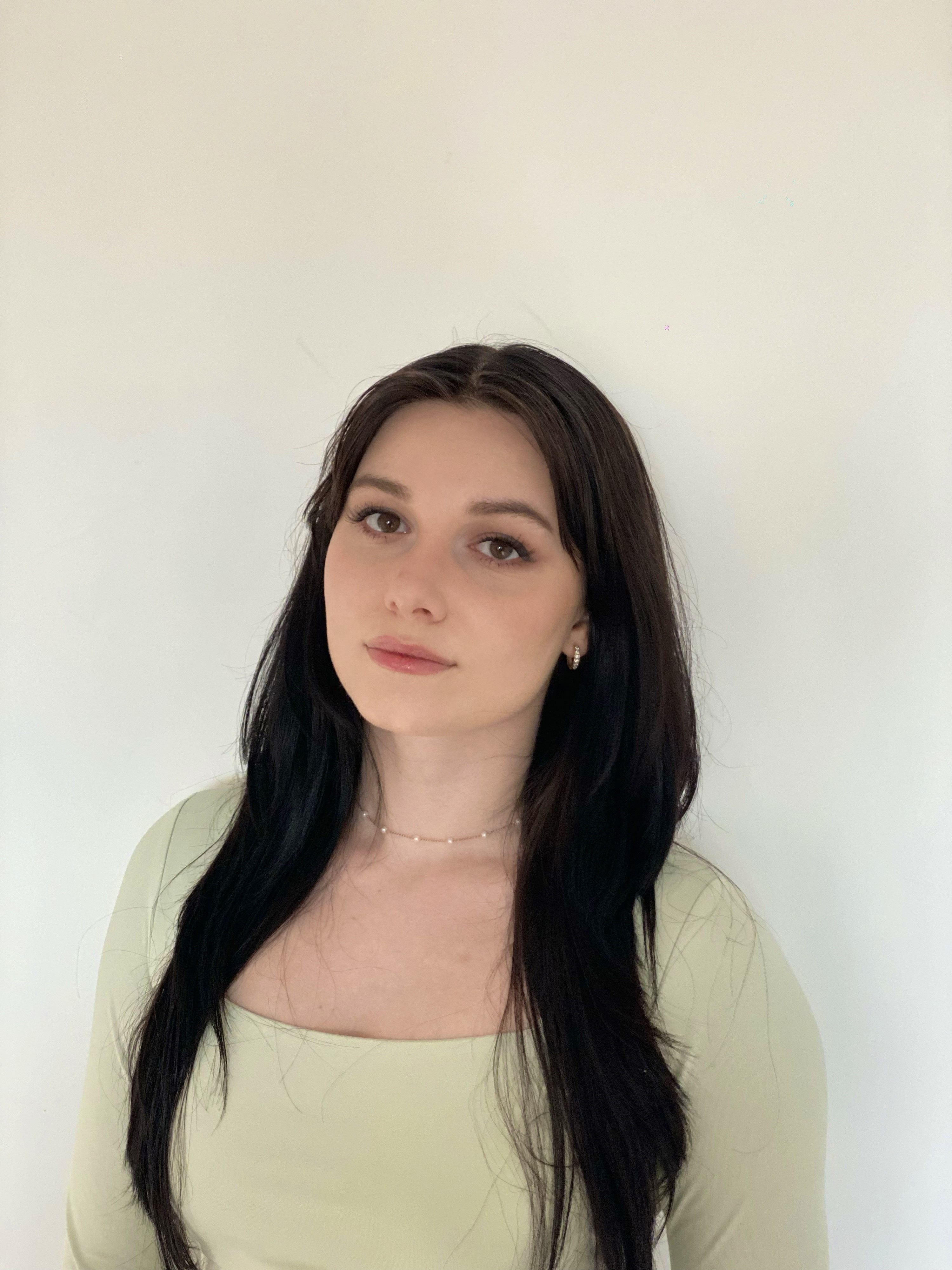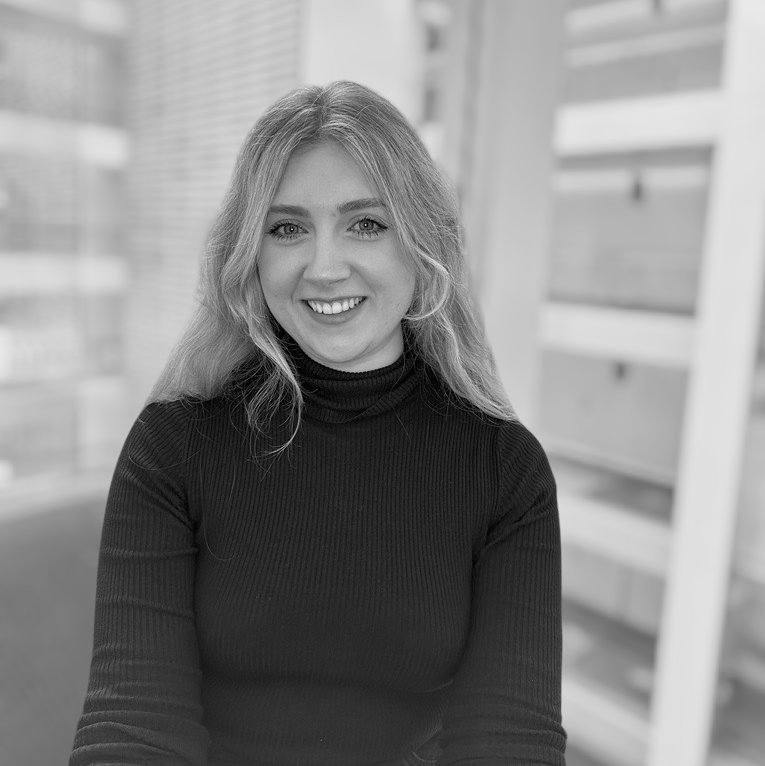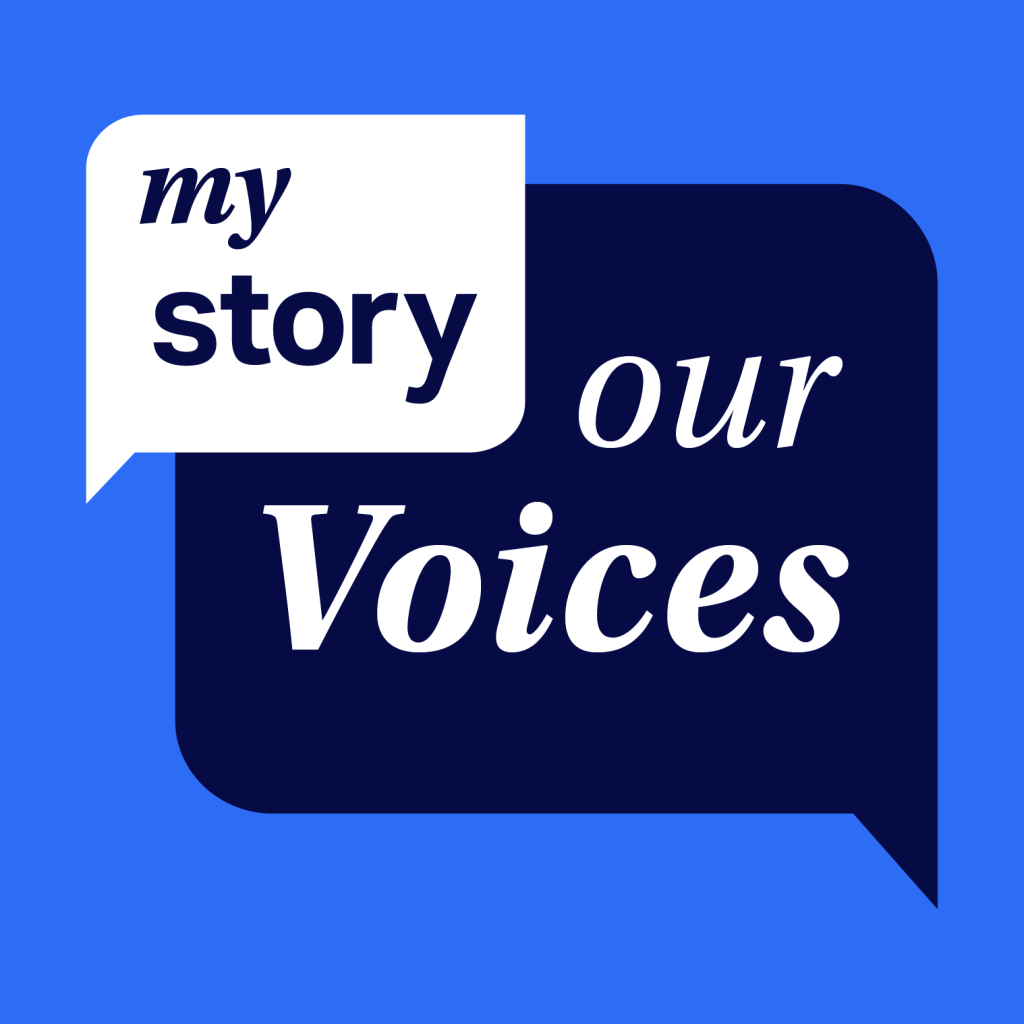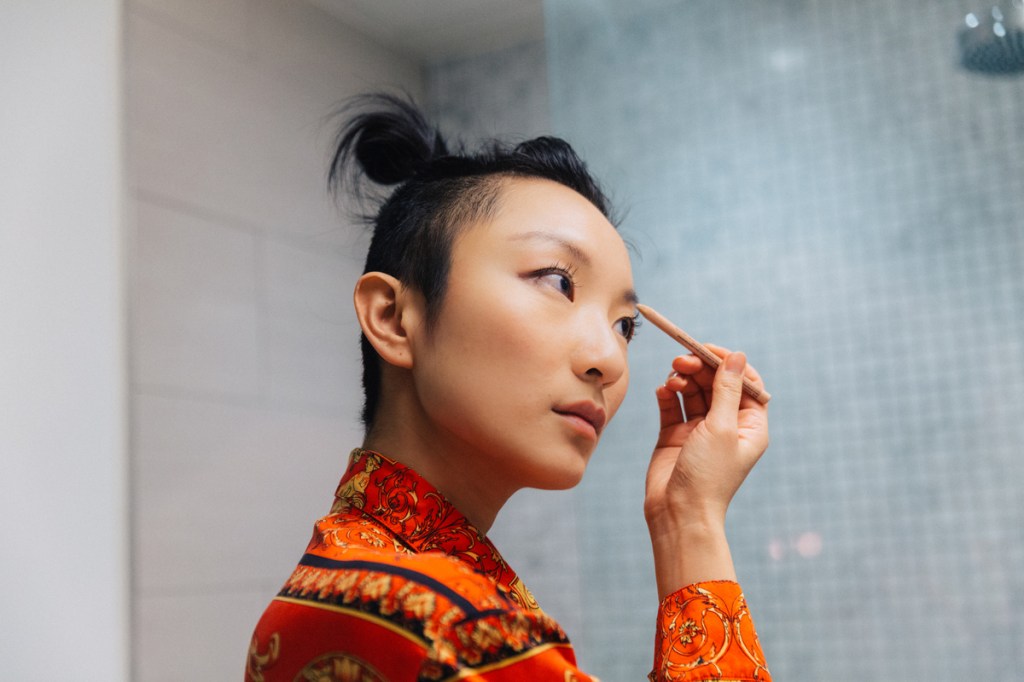Join us as we chat with Finalists of the ‘Women in Tech’ Awards and dive into the inspiring journeys of three trailblazing women who are breaking barriers and driving change in the tech industry. Hear from Cheryl Rosenthal-Warlow, Maddie Peacock, and Sasha Druzhinin as they share their stories of overcoming challenges, fostering diversity, and empowering the next generation of women in tech. Tune in for an engaging conversation on mentorship, inclusion, and the power of staying true to yourself. Don’t miss this episode packed with insights and inspiration!

Summary
“One of the things I found when I joined tech was that there are very few women, and I was incredibly fortunate to have a female manager. I do put so much down to my career being so successful and me being so confident in myself and as a woman in tech [is] because I’ve had female managers.” – Maddie Peacock
This episode of My Story, Our Voices – part of NielsenIQ’s DEI Learning series – features a conversation with women in the technology industry. We welcome guests Cheryl Rosenthal-Warlow, Maddie Peacock, and Sasha Druzhinin – all of whom were finalists for the UK’s Women in Tech Excellence Awards. Hosted by James Anderson and Elana Powell, the episode delves into the guests’ journeys, achievements, and insights on fostering diversity and inclusion in tech.
Cheryl Rosenthal-Warlow, a VP in the CTO Office and a finalist for the Woman of the Year Award, shares her story of driving positive change through leadership. With a focus on nurturing talent and promoting diversity, Cheryl has been instrumental in supporting graduates with no tech experience and advocating for various DE&I initiatives. Her passion for inclusion is partly driven by her personal experiences, including raising a disabled son. Cheryl emphasizes the importance of using one’s position to influence change and raise awareness on topics like women in tech, disability, neurodiversity, menopause, and social mobility.
Maddie Peacock, the Portfolio and Integration Director for CMI, discusses her non-linear path into tech. With a background in history, Maddie found her way into Cheryl’s team and quickly realized the lack of female representation in the industry. This led her to co-create “She Talks Tech,” a platform aimed at giving women a voice and fostering a sense of community. Maddie highlights the significance of having female managers and mentors in her career, which helped her gain confidence and thrive in a male-dominated environment. She also shares her experience of overcoming imposter syndrome and the importance of creating diverse teams.
Sasha Druzhinin, an IT Security Analyst and finalist for the Rising Star of the Year Award, recounts her journey from studying criminology and psychology to pursuing a career in cybersecurity. Sasha’s determination and networking skills led her to a junior role at GfK [now part of NIQ], where she was the only woman in a department of 40 people. Despite initial challenges, Sasha’s contributions and willingness to learn quickly set her apart. She emphasizes the value of building relationships, seeking mentorship, and staying true to oneself in a corporate environment.
The podcast also explores the challenges and opportunities of being a woman in tech. Cheryl, Maddie, and Sasha discuss the importance of creating inclusive environments where everyone feels welcome and valued. They share personal anecdotes about balancing authenticity with the pressure to conform in a traditionally male-dominated industry. The conversation highlights the need for leaders and managers to actively support and promote women in tech by providing platforms for visibility, mentorship, and sponsorship.
Cheryl reflects on her experiences of building relationships through social interactions, such as going to the pub after work, and the impact of these connections on her career. Maddie and Sasha discuss the evolution of their personal styles and how becoming more comfortable in their roles allowed them to express their true selves. They also touch on the significance of addressing diversity topics openly and the fear of being labeled as the “woman always talking about gender and diversity.”
The episode concludes with actionable advice for leaders and managers on how to support women in tech. Cheryl emphasizes the importance of giving women a platform to speak and encouraging connections across different levels of the organization. Sasha advises asking questions and taking opportunities, even if the answer might be no. Maddie underscores the need for visibility and celebration of women’s achievements, as well as creating hiring practices that bring out the best in candidates.
Overall, the “Women in Tech” podcast episode is an inspiring and insightful discussion on the journeys of three trailblazing women in the tech industry. It highlights the importance of diversity, inclusion, and the collective effort needed to create a more equitable and supportive environment for women in tech.

Sasha Druzhinin
London, England
Junior IT Security Analyst
Sasha joined GfK straight out of university in September 2022 as a Junior IT Security Analyst and in this short time gained a varied skillset from working in the different cybersecurity domains, including incident response and web-application security and risk management. Since joining the company, she was keen to get involved in the different DE&I initiatives the company hosts and joined an all-female panel, talking about the importance of networking and shared her thoughts via the company blog.
For her hard work, Sasha was named a finalist in the 2023 Women in Tech Excellence Awards as Rising Star of the year. In her free time, Sasha enjoys weight lifting, aerial hoop and exploring the city of London where she lives.

Maddie Peacock
London, England
Portfolio and Integration Director
As the Portfolio and Integration Director at GfK – an NIQ Company, Maddie spearheads the implementation of Agile and SAFe methodologies, orchestrating their seamless integration into our workflow. Leading a team of agile coaches, she oversees the orchestration of CMI integration workstreams, ensuring our milestones for tool, process, and technology alignment are met.
Throughout her time at the company, her dedication to diversity and inclusion has been core in everything she does. Maddie played a pivotal role in establishing and steering a tech council in 2021, called She Talks Tech, dedicated to addressing industry-specific DE&I challenges, particularly the underrepresentation of women in tech roles and STEM fields.
Maddie was named a finalist in both the 2021 and 2022 Women in Tech Excellence Awards, and receiving the Role Model of the Year award in November 2022, serving as a testament to her commitment to fostering positive change within the industry. She Talks Tech was also named a finalist in the 2023 awards for Diversity and Inclusion Initiative of the Year.

Cheryl Rosenthal-Warlow
London, England
VP, CTO Office
As VP of the CTO Office Cheryl is able to combine her two passions: technology and change; and cultivating talent for the future. With over 40 years of experience, she has a strong understanding of management, technology, finance, people and GRC.
Part of the technology leadership team, she is responsible for ensuring the team meet their financial targets and have an efficient flow of information between the tech teams and other functions.
Cheryl is driven by a desire to transform the industry as it becomes diverse and often speaks internally and externally to share her insights into diversity issues including women’s health and disability. As a mentor, Cheryl enjoys helping the younger generation as they enter the early stages of their careers. From a professional perspective, Cheryl believes her greatest achievement is the next generation. In 2023 Cheryl was named a finalist in the Woman of the Year category at the Women in Tech Excellence Awards.
She is a big foodie so in her spare time she enjoys being in the company of family and friends, eating great food and catching up. Cheryl loves to travel and try to spend as much time as she can in France and Australia. If she is not on a plane or in a restaurant, you will find her enjoying the Peak District with her husband and cocker spaniel.
Transcript
Jake Conlin: The views and opinions expressed in this podcast belong to the individuals who shared them and do not necessarily represent NielsenIQ. Note that this podcast discusses sensitive topics that may be triggering for some. For more information specific to this episode, see the episode description. Hi everyone and welcome to My Blank Story, a core component of NielsenIQ’s DEI Learning series, Me & You. My name is Jake Conlin, and if this is your first time tuning in, then let me tell you what this podcast is all about. In a nutshell, it’s about stories…your stories. We think stories are important because when we tell them we open the door and allow others to see the experiences that shaped us, that challenged us, and helped us grow. By doing this, we can create a culture where open dialogue is encouraged and we can have a space to discuss important topics in a transparent and courageous manner. So minimize that e-mail tab, mute your chat, and take a little break to listen to a NielsenIQ story.
James Anderson: Hello everyone, and welcome to another episode of My Blank Story, an NIQ GfK podcast, sponsored by Diversity and Inclusion. My name is James Anderson and I’m one of your co-hosts today. I work out of the Toronto office, and my pronouns are he and him. I’m joined today by my special guest host, Elana. Elana, welcome to the show.
Elana Powell: Thanks, James. Hi everyone. My name is Elana Powell. My pronouns are she/her and I’m the Senior Manager of Diversity, Equity and Inclusion, and I am super excited to be here hosting my first episode. I am even more excited to have our special guests with us here today. We have three guests who will be introducing themselves shortly here, but all three of these women are truly remarkable and were all named as finalists for the Women in Tech Excellence Awards last year. For those of you who haven’t heard of those, I suggest you do some Googling; but for a brief summary, essentially, these awards recognize, they celebrate, and they showcase trailblazing women from across the technology space and provide inspiration for younger women who are curious about building a career in the tech industry. So, let’s meet them. First off, I will pass it over to Cheryl.
Cheryl Rosenthal-Warlow: Hi, Elana. Thanks. I’m Cheryl. My pronouns are she and her. I work from the London office, but now I live in Buxton and I’m originally from Australia (in case you can’t tell from the accent). And I work in the Technology PMO team leading Strategy, Planning and Governance. I joined GfK in August 2018, so I’ve been in the company for over five years. Outside of work, I love to travel, meet people, enjoy lots of different food. I also love just hanging out at home with my husband and my crazy Cocker Spaniel.
Elana Powell: Awesome – thanks so much, Cheryl. And how about Maddie?
Maddie Peacock: Thanks, Elana. Hi, everyone. I’m Maddie Peacock. I am based in the UK, like Cheryl. I live just outside of London in a very small village. Not a lot going on here. I am the Portfolio and Integration Director for CMI, so that means I’m working with our teams to make sure that we can work well together, that we are building products that work for not just us, but for our clients and our end users. And I’ve been at GfK NIQ now for just over five years. And my hobbies and interests… I am a big reader. I’m always seen with like my head in a book and love just being outside and my pronouns are she/her.
Elana Powell: Amazing. Thank you, Maddie. And lastly, we have Sasha.
Sasha Druzhinin: Yeah. Hi everyone. I’m Sasha. My pronouns are she/her. I work in the London office and I live in London. I’m an IT Security Analyst and I work on our cybersecurity team at NIQ GfK. And I’ve been here for around a year and a half now. I joined as a graduate doing a rotation through our different cybersecurity teams, which I’m actually due to finish soon. But yeah, outside of work, I’m super into health and fitness. I weight lift, I do calisthenics, and I also really enjoy aerial hoop.
Elana Powell: Amazing. Thank you all so, so much for being here. We’re very excited to start this conversation. James, you want to kick us off with the first question?
James Anderson: Sure. I’ll start with Cheryl, actually. Now I know that you were named a finalist in the category at the Women in Tech Awards for Woman of the Year, and that’s an incredible achievement. Can you tell us a little bit about why you were nominated for this award and maybe how you got involved in tech in the first case? Because I believe it’s a bit of an interesting story.
Cheryl Rosenthal-Warlow: Sure. Well, I guess. You’d have to ask the judges to be sure, but I would say it was about my focus on using my role as a leader to drive positive change. I’ve always had a natural inclination to nurture talent. In more recent years, I’ve had the opportunity to bring in grads with no tech experience and support them through what I would call the unofficial Cheryl grad scheme – in fact, one of them is on this panel. As well as developing talent, I’m really passionate about diversity and inclusion. My son’s disabled, so I think that’s one factor driving my passion. But I just really strongly believe we’re all better for embracing differences. I’m very grateful that I’m now in a position where I can influence change and raise awareness, so I’ve been sponsoring a number of different DE&I groups within the company, as well as speaking at conferences and on panels and to various other groups on topics like women in tech, disability, neurodiversity, menopause, and social mobility. So I think that my focus on using my position for positive influence was really a key to my being selected as a finalist.
James Anderson: That’s an amazing journey. And I know that you mentioned that you actually mentored or welcomed into the company one of our other guests today, who is Maddie. So, Maddie, I just wanted to turn it over to you. And I know that you were deeply involved in creating a network platform called She Talks Tech, so I wonder if you could sort of tell us a little bit about that story of how you connected with Cheryl, and then also how you created this platform.
Maddie Peacock: Yeah. Thank you. Yeah. My journey, I think like many women that we tend to hear from in tech, is we do not have very linear paths into technology. And mine was one of those. So I come from a historical background…so, I have a history degree. And I really magically quite stumbled across across a job in Cheryl’s team and at that time it was really kind of undefined. We didn’t really know what we needed from it, and I didn’t really have any technical skills to be able to kind of come into a non entry-level position. And so Cheryl definitely took a punt on me as we would say. She took a chance, and it’s really grown and blossomed. And one of the things I found when I joined tech was that there are very few women, and I was incredibly fortunate to have a female manager. And I do put so much down to my career being so successful and me being so confident in myself as a woman in tech because I’ve had female managers. And so yeah, with that in mind and kind of being very aware of the lack of women, not just in the office, but especially, you know, during COVID where we all went remote and we’re all on video calls, you really start to miss the presence of women around you – or I did, especially. And so my colleague Emma and I, we set up She Talks Tech, which was really aimed to give women a platform to kind of express their opinions, raise their voice, and just make being a woman and being a woman in tech feel a little bit less lonely. So Emma and I, we kind of teamed together and set up all of these panel discussions, in-person meetings for women to connect, just to really bridge the gap between what it feels like to be a woman in tech and what it feels like to also be part of an incredible community. And I think we did quite a good job.
Elana Powell: Absolutely. Just listening to all of you women speak, it’s making me think maybe I could be in tech, you know, because like, I don’t have a traditional tech background and I’ve never thought about it for a career. But all of you are just kind of sharing all these different backgrounds that can come up and it’s amazing to see this kind of development and how we’re growing in this area. I wanted to turn it over to Sasha for a minute here…I want to hear from Sasha. I know that you were named a finalist for Rising Star of the Year, and it was very early in your career here in tech and that must have been such a proud moment for you. So we just wanted to learn a bit… how did you set yourself apart from others so early on in your career?
Sasha Druzhinin: Yeah, it definitely was a very proud moment. But to cover my background and journey a bit here. So, at Uni I studied criminology and psychology and by the 3rd year I was determined [to focus on] on a career path in tech, specifically cybersecurity. During the same time, I was networking quite a bit to find a job and I was sending multiple applications for jobs and graduate programs and, I didn’t get into a lot of them, but throughout the networking and everything, one of the connections I actually made sent me an invite to a cybersecurity meet up that GfK was hosting at the time. This is actually [the place] where I met my now [current] managers and colleagues, and I was getting along really well with everyone, so obviously I saw [it as] an opportunity. And it’s quite funny, actually, because I ended up chasing one of the recruiters down the hallway as she was leaving and as I was walking beside her I gave her the quickest pitch ever and got her LinkedIn to send my CV and luckily they were looking to hire more graduates at the time so I joined into a junior role on a rotation. And I was the only female at the time in the Department of 40 people. And yeah, this was the start of my journey. So, to answer the question about setting yourself apart, you know, there’s one thing “landing the job”, but when I had the job, I made a lot of effort in getting to know people at the company. I was introduced to Maddie and Maddie helped me a lot. Maddie mentored me. So, that was definitely really useful, but I did contribute a lot more than I expected to the team and the work that we were doing considering I had no prior experience and, this was quite…I guess this was seen by my colleagues and my managers. So, within my first six months, without getting too technical, I rolled out a process that enabled my team to effectively report vulnerabilities to each business group on a regular basis. I co-presented [this] with a colleague at our annual tech and Data Conference in Athens. To demonstrate the impact of a web vulnerability, and I was actually, one of the few women to do a technical presentation at the event. And I took part in “She Talks Tech”, as well. And I wrote an article about networking in tech which kind of came off the back of the “She Talks Tech” event that we did – talking about my experience – and I also established an early careers network at the company. So, we had. Quite a few juniors, but we were all dispersed in different departments and there was no way for us to actually…kind of…no opportunities for us to meet each other, really. So, I used this as an opportunity to bring everyone together and, kind of, have a more shared experience and we hosted some events for everyone to meet. And in the long term, we wanted to use it as a way to also improve onboarding experiences and support graduate programs.
James Anderson: Thanks so much, Sasha. Those are some terrific, terrific ideas and learnings that a lot of our listeners can take away. Now, I wanted to take just a step back because you’ve all introduced yourselves, and we know a little bit more about you. Now, we know that you all had interesting journeys into the tech world and when I was doing my research for this and we all had a, sort of, a previous meeting, kind of getting ready for this, I was making notes and [as] I was writing things down and I was using a lot of acronyms and I know in the professional world we love to use our acronyms for short forms for everything. And I began to notice that there was a similarity between [the acronyms for] “Women in Tech” [WIT] and “woman in the room” [WITR]: [they] are almost the exact same letters. And I think it was touched on a little bit earlier, but…it appears that tech can be a very male-dominated environment, as someone mentioned, [and] that, you know, it can feel like that. And I’m just wondering if each of you would talk a little bit about moments of this [dynamic/situation, as this] is a diversity podcast. So, we want to talk a little bit about what were those experiences like and what was different for you being in the room? What changed? Maybe perhaps because you were in the room?
Cheryl Rosenthal-Warlow: I think for me, actually, if we go way back, my parents actually owned a manufacturing company. So, being in the room where I was the only one who was [a woman] actually [felt]fairly familiar to me, if I could go way back. So being in tech, I think I was just used to being with a lot of men and almost didn’t notice it, in some ways. What I did notice was when, at a previous company, I was one of the founding members of a women’s network and, being in a room that only had women in [it], it seemed, actually, really peculiar, more peculiar than even being in a room full of men. If I do talk about, say, my first times of being in the room when it was like the senior leadership team – so, when I first sort of took on that new role – and that was definitely all men in the room, for sure, then I found everybody had a lot to say and I held back because I wasn’t sure if what I had to say would be relevant. Would I get things wrong? [A] bit of imposter syndrome, etcetera, etc. But actually do you know what? Over the years I’ve learned, that is my way: I think it’s really important to listen. You don’t have to speak for the sake of speaking. I’ll say something if I think it will add value. So, I would say to people, you know, you don’t have to be speaking all the time just because everybody else is speaking. It’s OK to listen, as well, and you are in the room because you deserve to be there. So, that would be my little…some pearls of wisdom.
James Anderson: Maddie or Sasha?
Maddie Peacock: Yeah, I’ll go ahead. I was going to say I got goosebumps, as you said, you know, women in tech sometimes mean women in the room. Like, I’ve never heard it put that way. But it’s absolutely resonated with me and. And I think given the fact that I started my career quite young at GfK, I think when I joined, I, potentially, was the youngest person in tech in the UK at that time. And I happened to be a woman. And I felt like I was kind of walking around and everybody was really aware of it and that’s all they saw when they looked at me, with this person ‘who had no idea what she was doing’. And you know, ‘why is she here?’ ‘She doesn’t even know what Scrum master is.’ And these were conversations I’d have. And, at that time, I think I was absolutely almost overwhelmed by imposter syndrome. Like, I just couldn’t quite find my place or understand why I was there. And I think the thing that really changed [this] for me was [that] I had some incredible sponsors. So, not ‘mentors’, but ‘sponsors’ in the sense that these were people that were using their voice to help you get in the room and Cheryl, definitely, was that for me as my manager, at the time. But I also had some incredible women that I just, I think, I was blown away by the fact that they had fought to get their seat in a room, and they were offering the chair next to them to me. And I think once I kind of understood that these people were seeing value in me and that just because I’m young and I’m a woman doesn’t mean I can’t sit at the table. Once I found that strength, I was like, “Yep, I belong here and I’m gonna give my opinion,” and people either, you know, don’t have to listen to it, but that’s totally fine. Once I’d realized that, then I really embraced the power of also bringing other people into the room. So, looking around and being like: what is diversity like? What are the opinions in this room? Do we have somebody that’s going to be able to counter the way we’re thinking? Or are we all on the same page and we don’t want that right? We want diverse teams. We want differences in thoughts and opinions and backgrounds. And so yeah, whilst I do think I originally felt like I was the only woman in the room, I definitely now – and I think a lot of women in tech make it their mission – for that not to be the way and to, you know, offer as many seats at the table as possible to other women or men, or anybody who’s deserving of it that hasn’t got the courage themselves to walk into the room.
Sasha Druzhinin: Yeah, I think my experience is quite similar to Maddie’s and Cheryl’s. [In] the one [company] I joined, I was the only woman in the Department of 40 and also the youngest, so it was an experience I couldn’t share along [with] others. But I have grown accustomed to it – as tech is a fairly male-dominated industry – and when I was younger, I was also a gamer and most of the people that I was friends with and gamed with, at the time were men. So, I think I just naturally got used to it and, at school, I joined a robotics club, and I was the only girl I. And the same with Uni[versity] clubs that were related to tech; I tend to to be the only woman. And again, at networking and events [I was the only woman]. So, it’s just something that I’ve gotten used to. But when I joined my first corporate job, the biggest challenge was the imposter syndrome: being the youngest and trying to fit in and not necessarily having people to relate to. You know, I came in with no experience. So, sometimes in conversations I felt like I was expected to know things that I didn’t. And there’s no way I would have at the time – to be honest – but really, this shouldn’t have been seen in a negative way. It was a huge learning curve. And I also learned, overtime, that you’ll never know everything in the industry, but I’m grateful for my team and colleagues. They were quite, you know, they were more aware of the fact that I was the only woman and that I was young so, … I was never made … I never felt uncomfortable in a room with them, never felt that people didn’t listen to me or anything. So, my team was very supportive and welcoming, and it was also important to me that I had people that made me feel comfortable and that let me pick their brains and didn’t make me feel inadequate for asking questions; so, I was truly in an environment that I could thrive in. But also acknowledging the differences, when I first joined, was one of the things that actually inspired me to start the “Early Careers Network”.
Elana Powell: Fantastic. Now, I’m getting some terrific takeaways from all of you right now. And one thing that kind of popped out was: the importance of that inclusive environment that you were just talking about, Sasha. You know, making sure that we’re welcoming everyone, not making them feel “less-than” even if they are different. But I know that a lot of women can struggle with, you know, balancing staying true to who you are. And kind of “conforming” to that new environment, right? The environment that has traditionally been male-dominated. [By] Entering into those spaces, you might feel some pressure to change or be different. Do any of you have any experiences with that? How it felt, how you ensure[d] that you were staying true to yourself. You know, Cheryl, making sure that as you said, you were continuously waiting to, you know, listen and keeping that top of mind rather than just jumping in because that kind of seemed like the thing to do. So, do any of you have any advice on that space?
Cheryl Rosenthal-Warlow: All I can carry on, I think, from my example of being in a room with a lot of senior leaders and being more of a listening [participant] than a speaking-all-of the-time [participant]. I definitely reflect now on how I built relationships in the tech world because I’m in a position where people will ask me, ‘how did you get there?’ ‘How did you navigate everything?’ I think, number one, I’ve just been dedicated to doing a good job and people have genuinely respected that. There is an element though, of the social aspects of working and which is actually a real shame now that we just don’t get to connect as much in person as we did before. But we go back a few years, in London particularly, there’s quite the culture of going to the pub after work. And I joined in with that most of the time. I found it a great way to get to know people a bit better. I genuinely think for me it helped with relationships in the office and getting things done, just because you would get to know people behind the scenes a little. I do reflect though, when people are asking me for advice about, you know, how you build relationships: did I do that because I thought I needed to? Or did I do that because I genuinely wanted to? I do think I genuinely wanted to do that because I actually, am a very sociable person who likes to go out and chat with people, and I’d like to have a couple of drinks. So, I don’t think it was me doing something that I felt like I had to [do for advantage]. I think it was something I just did because I enjoyed it. But don’t get me wrong, I wouldn’t necessarily recommend that as your “top tip” to building relationships with everybody in tech. You have to do what’s right for you, and there’s many different ways of of being able to build relationships. And respect and, I mean, doing your job well and owning your career, I think that would be one of the things [that’s most important]. Sorry, this is a slight segue, but I think that one of the big differences I see now and have so much respect for [people] like Maddie and Sasha [is] that [they] really are great examples of taking ownership of their careers. I don’t think I did that. If I reflect, I […] worked hard at trying to do a good job but [I] didn’t really work on my career. So, actually, I do think it took a lot longer for me to get to a more senior position than maybe it should have. So I would say use Maddie and Sasha, as your role models for taking ownership of your career. And not so much for me, to learn from my lessons.
James Anderson: Maddie or Sasha?
Maddie Peacock: To the first point on the, you know whether or not you find yourself being able to stay true. Funnily enough, I actually – this is one of my answers for my role model application I did a few years back, and one of the things I actually noticed as my career went on, I became so much more comfortable and as I said, you know that fear of imposter syndrome kind of slowly was dwindling away. I was finally understanding myself a bit better. There was actually a change in what I would wear to the office. So when I started out I, you know, I think there was only about 10 women in our tech office at the time. I was very much a trainers, T-shirt, jeans kind of person. And now I’m like full floaty maxi dress. Like as feminine as I feel comfortable. Like it’s been a huge transformation and I think that that really does reflect just how comfortable I am in myself and I’m way more about turning up the work as who I am, not for what is making other people feel comfortable or what they think about me. So definitely. I definitely saw that, but also to Cheryl’s point, you know, I did probably also experience a drinking culture thing. I am no longer a drinker, but definitely in my early days of my career that was probably something I didn’t want to do, and it felt like it was the way to network and connect with people. So I definitely feel like it comes with maturity and I’m kind of glad I’m in a management position now, having gone through that so that I know how to support the people in my team because had I not gone through it, I think it’s very easy to kind of brush it under the rug and not really check in on people to make sure that they are happy as an individual. Whereas now I’m so much more conscious of that and so much more about getting to know a person for who they are so that I can bring their best self and help them be confident in who they are at work.
Sasha Druzhinin: Yeah, I think the appearance one is actually quite big. I remember when I first joined and was really just trying to fit into the corporate kind of vibe and you know, I dyed my hair red last week, so it’s really changed. It’s changed quite a bit and I come in like, whatever I want to wear, and I think I’m testing the limits more and more every time, but it just shows how comfortable I think I’ve gotten with being the odd one out. You know, because when I first came there was that pressure of, “OK, I have to fit in, I have to go to the pub.” I need to…also feeling a slight pressure as the only woman in the room to represent women in cybersecurity. But I got over that by learning as much as I could. Absorbing as much knowledge as I could, building my confidence and you know. Building the relationships with my colleagues and I don’t feel any imposter syndrome anymore. Maybe I might occasionally, but it’s definitely gone down. And I would always be the odd one out. So, I just learned to embrace that and that’s where I am now, I think.
Maddie Peacock: I will add one thing and maybe Cheryl, you felt this, but in terms of conforming and like being who I am, one of the things I was really afraid of was talking about diversity and my experience as a woman quite early on because it’s quite fearful of just becoming known as the woman always talking about gender and diversity. And I mean it’s something that I’ve been really passionate about. And as soon as I kind of joined the company and met these incredible women, I was like, yeah, this is a cause that I really believe in, and I want to talk about, but I definitely felt like it was going to be harmful to my career. And I mean, I got over that, you know, after about six months and thought, “no, that’s it.” And, you know, set up councils and networks and stuff. I mean, it didn’t last long. But there definitely was this feeling that I couldn’t bring that passion about caring about women. Immediately, just in case, I was going to become the annoying woman in the room that everybody kind of, you know, rolled their eyes at and thought, “oh, here she goes again”. But yeah, as I said. As you become more comfortable in yourself and you realize what drives you at work and what you’re passionate about and what your values are, you can throw all that kind of fear out the window and just be that woman that, you know, represents who you want to be.
Cheryl Rosenthal-Warlow: I…look, I think that’s something that I totally respect in like Maddie, Sasha, other women because – yeah. And I think if I look back, you do have…it’s not so much a fear, but just a hesitation perhaps in you know, am I not going to fit in now if I start raising these things, is it a bit of a tricky topic? I mean, I am really grateful now that there are so many people talking about these topics and hopefully I’m now able to help facilitate and get some airtime for that across the board, I think. It’s so much better. It’s better for me that I’ve been inspired by people like Sasha and Maddie and one of the other tricky things though, I think, related to this is that as women, and particularly when you’re in a senior role, it’s almost like it’s expected that you will take care of all these topics. You can be sometimes sitting in a room, and they’ll be on the agenda. Something that is to take care of, let’s just say softer topics. And none of the boys will put their hand up, and it’s almost like, “oh well, here it is. It’ll be clearly on me again”. But hopefully we’re changing that and getting a lot more allies. I mean, across all different aspects of diversity because it shouldn’t just be down to the person who was part of that group. It should be all of us, educating one another and learning more so, do think we certainly have a long way to go. We’ve come a long way, but we have a long way to go.
James Anderson: Now we’ve talked so much about what you can do to own your career, the personal steps that you’ve each taken and some of these stories have just been wonderful. You know, acknowledging, you know, what it is like to sort of be in the room and all of that. But I wanted to ask each of you because you have each developed so much in your careers. How can leaders and managers get involved to get more women in tech and to continue those conversations?
Cheryl Rosenthal-Warlow: Well, I think it’s we’ve been talking about it, a little bit – here is that I think a really important part of my role is to do just that – to make sure that the other women in tech have a platform and not just in the company, but outside of the company. And that’s something that particularly in the last few years, I’ve realized that’s one of my responsibilities as a leader and in tech and as a woman. Well, actually just as a leader in tech, frankly, I think it’s really important to be able to give people a platform to speak about things. I also…one of my, I guess, tips to people. Reach out to other people and connect with other people you know even don’t be worried about talking to a senior person because quite frankly, they’re just human beings and it can be quite a delightful change to be having a chat with somebody who’s a really enthusiastic person at the beginning of their journey, rather than sitting in a meeting with a bunch of other people talking about budgets day after day, so I think I would just say go out, try lots of different things, get a mentor. And connect with people which, as I’ve said a few times, you know, Maddie and Sasha have done really, really well – having somebody who can sponsor you is great. That’s possibly not something you can orchestrate yourself. It probably happens more organically, but you can sure get yourself a mentor.
James Anderson: And Sasha, just wondering if you had a comment about that, I know in our in our pre-discussions you talked a lot – you mentioned the idea of asking the question when you want to just to know even for your own peace of mind to know that you had asked the question.
Sasha Druzhinin: Yes, that is definitely a big piece of advice that I would give is if you don’t ask, the answer is always going to be a no. So, you might as well talk to people, try and take the opportunity, send that application, ask the question and you never know where it will take you. You know the worst thing that could happen is rejection. But don’t let it demotivate you. It’s important to stay determined and be focused on what you want to achieve.
James Anderson: And Maddie?
Maddie Peacock: I think for me, I think you know, leaders and companies can do so much by just making people visible and just really celebrating individuals where they should be celebrated and deserve to be. And so, I mean, when I took my recent position and moved into leadership – I was absolutely blown away by the number of women messaging me. Saying like, “this is so great to see such a young woman in this kind of position” and I, you know, I was actually blown away and I couldn’t believe it. And then I thought, “hang on”. Yeah. When I joined it in my early 20s, I probably would have done the same thing and messaged my equivalent and said, “wow”, like, “this is really great”. Can I have a chat with you? Get to know what you’ve done, and I think companies need to do that more. They really need to celebrate and promote people. To you know, not on anything but what they stand for. But because there’s talent and we have so much talent and women don’t often come forward and talk about themselves in very confident manner. And so, I think leaders should be like looking in their teams, really trying to bring out the best in the people that they’ve got and making sure that when they’re hiring, they’re hiring in a way that brings out the best in that individual as well. So, you know, things like we do blind CVs or making sure that people get questions in advance. Small tweaks that can really put somebody at ease and really make them kind of thrive in that environment. And I think then, in general, we will see a lot more women moving into tech because it will feel like so many barriers have fallen down and that we see so many more women being successful in it.
Elana Powell: Those are all amazing responses, and essentially what I’m hearing is that we need to mentor a woman, we need to sponsor women, we need to amplify women, and we need to promote women.
James Anderson: Well, I want to thank each of you for joining us here on the podcast today. I feel we have we have covered a lot of amazing ground, and I hope that our listeners are able to take away even just a few of the learnings that you that you have each brought to us here today. Cheryl, Maddie, Sasha, thank you for joining us today on My Blank Story.
Jake Conlin: Hey, y’all, it’s Jake again. We hope you’ve enjoyed this episode of My Blank Story. Tune in next time to hear more stories from the NIQ community.
Cheryl Rosenthal-Warlow: Hopefully we’re getting a lot more allies. I mean, across all different aspects of diversity, because it shouldn’t just be down to the person who was part of that. It should be all of us.
Sasha Druzhinin: If you don’t ask, the answer is always going to be a no, so you might as well try and take the opportunity, send that application, ask the question and you never know where it will take you.
Maddie Peacock: As you become more comfortable in yourself and you realize what drives you at work and what you’re passionate about and what your values are, you can throw all that kind of fear out the window and just be that woman that you know represents, who you want to be.





